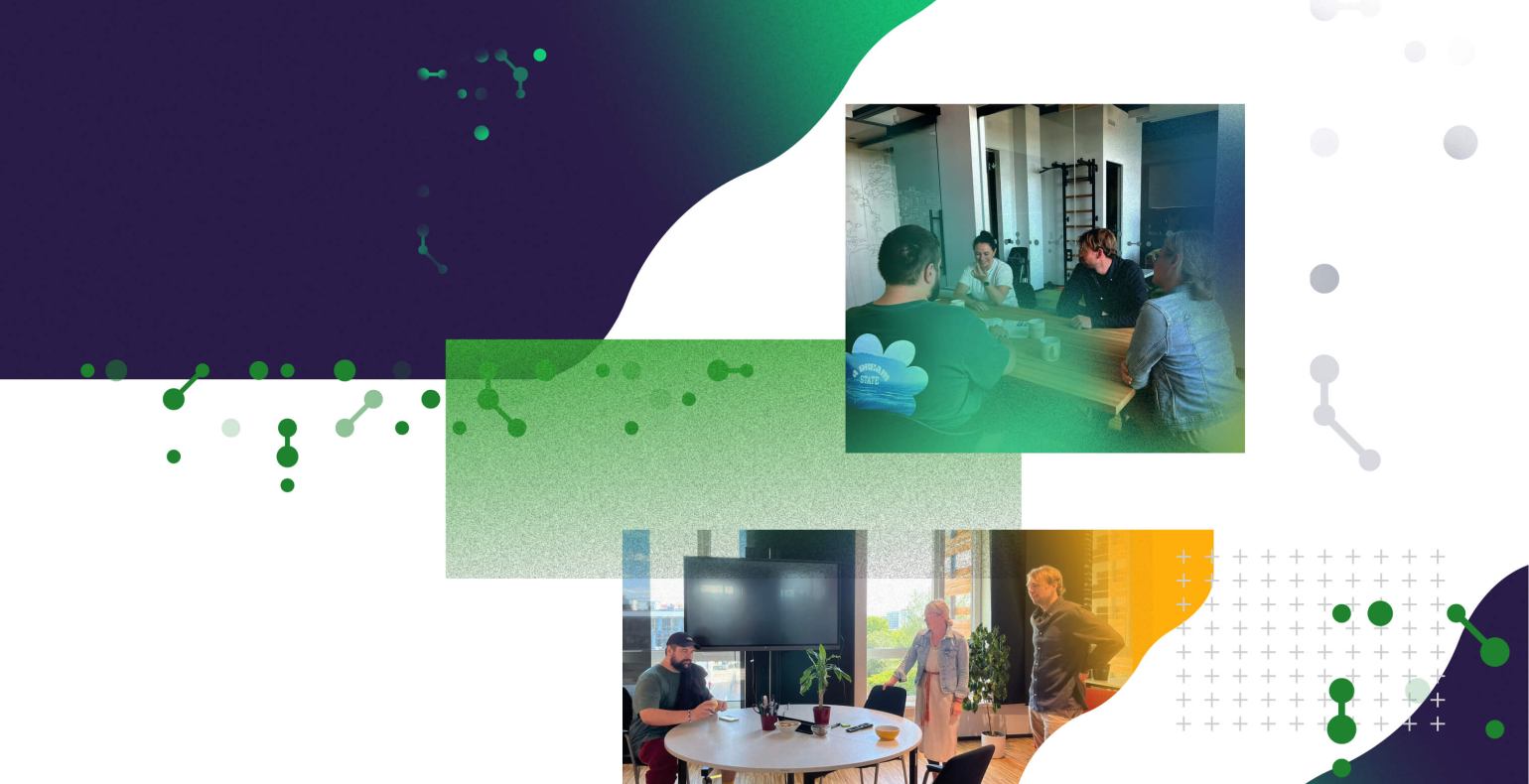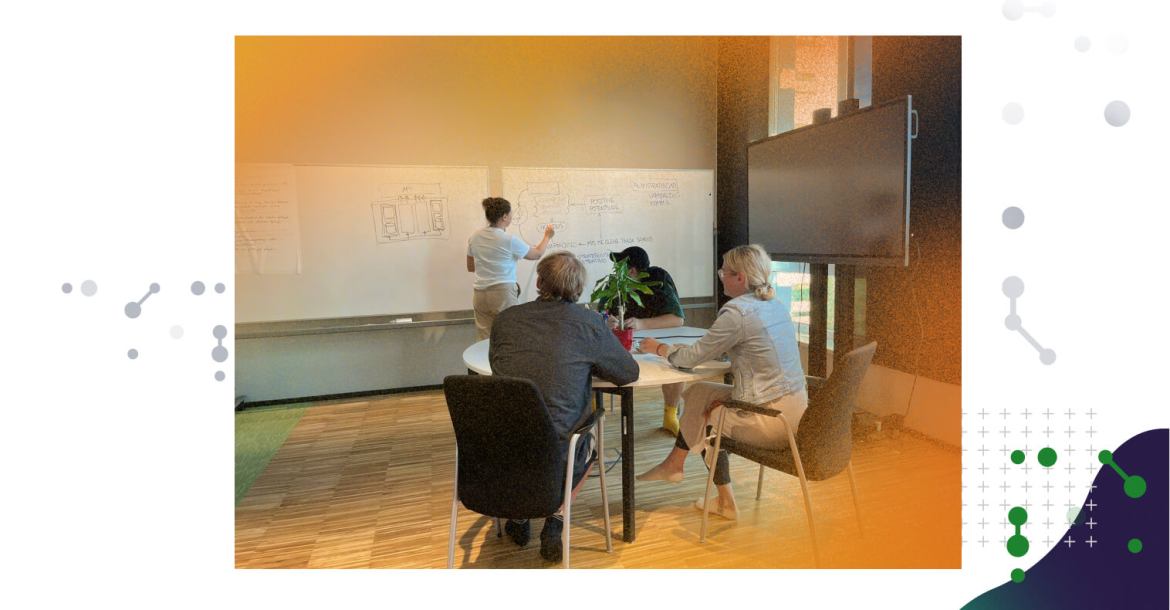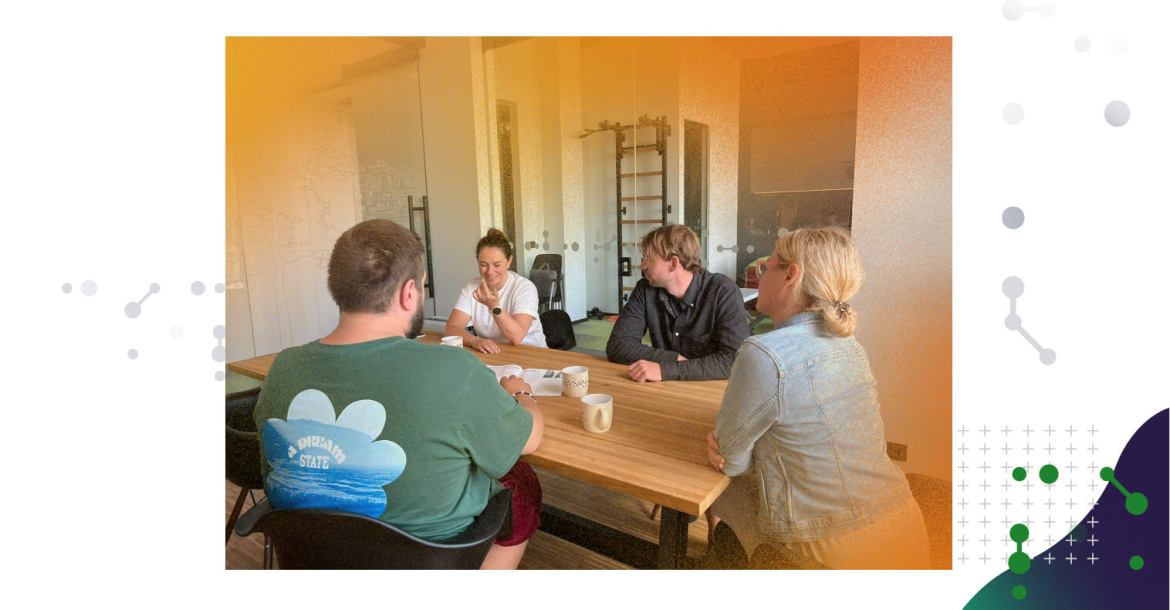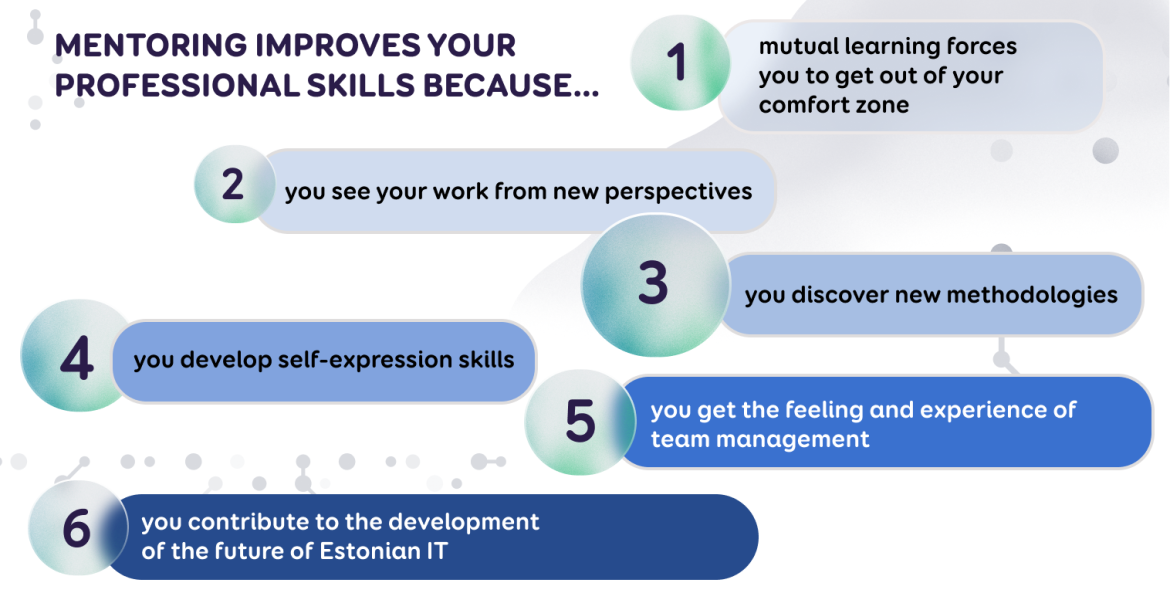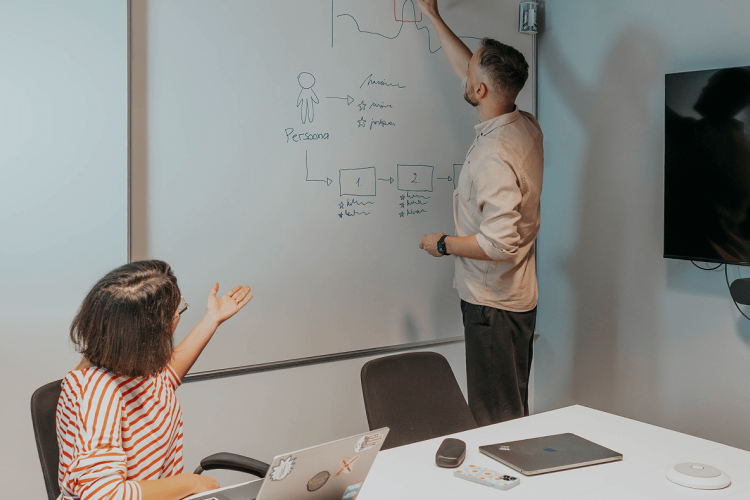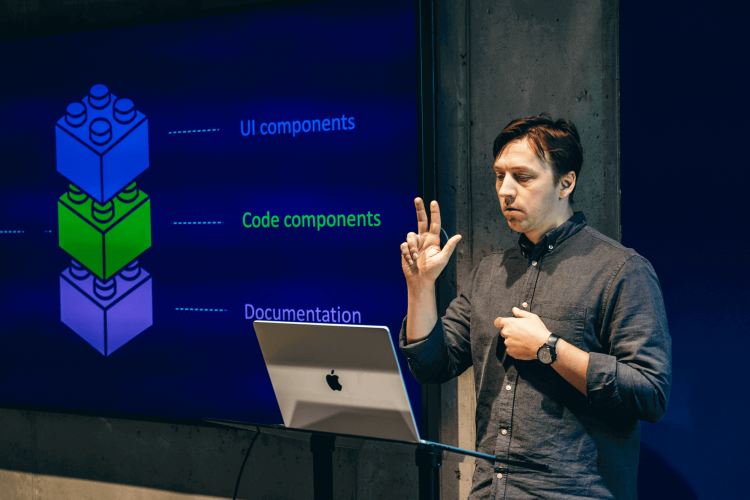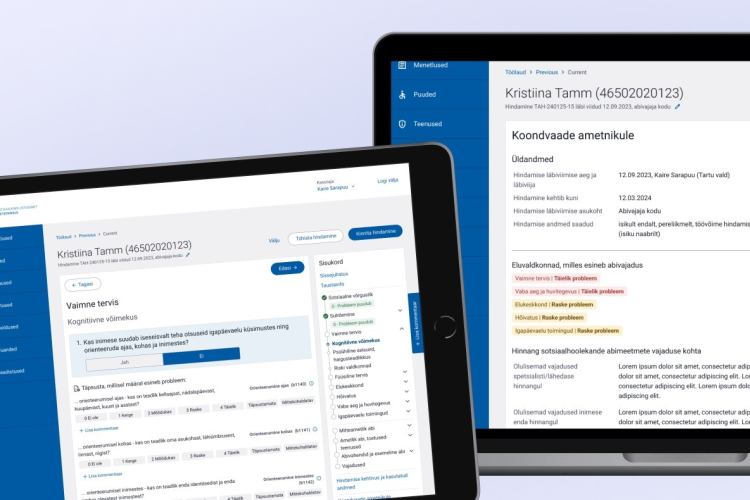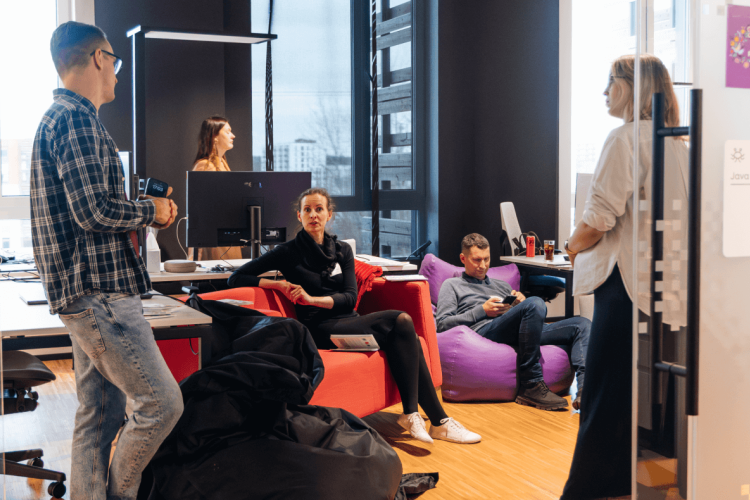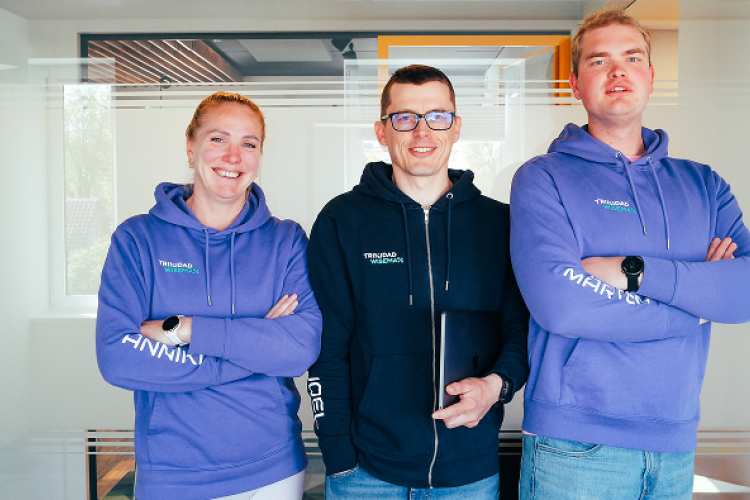Did you know that mentoring can help improve your professional skills?
Even if you are already an excellent specialist and do your job perfectly, transferring your knowledge to someone else can be tricky. But why should an already qualified specialist want to pass on his knowledge and experience?
From the end of March to the beginning of June, a full-stack development team of 8 interns worked in TWN's Tallinn office. They are Tallinn University's informatics students whose task was to create an information system for TWN offers.
At the same time, our designers were shadowed by 8 Master's students in the service and design management program of the University of Tartu Pärnu College. Beforehand, the students were given a short questionnaire prepared by the mentor to fill out, based on which TWN could help them better fulfil their job shadowing goals (including what the expectations are and what kind of work each person wants to do in the future). Students could, for example, create personas and test the accessibility of the website as part of the workshop.
This article shares the experiences of 16 trainees and 4 mentors.
What does mentoring experience give to professionals?
The leading mentor of the intern full-stack team was Hegle Sarapuu-Johanson, co-founder and Chief Innovation Officer of TWN. Our UX designer Timo Treit supervised the job shadow day. TWN developers Priit Puru and Joosep Jõeleht also participated in the interview as mentors. Whenever students had a question or thought, they could discuss it with their mentors.
What is it like to mentor such a large group?
"In any case, it is an interesting challenge, and the course of mentoring depends a lot on which people need to be mentored. I was fortunate, as the mentees turned out to be very practical and conscientious young people," Hegle rejoices.
"In the beginning, there was a bit of confusion with the names - a whole team full of new people at the same time, but the names of the best and most active ones are still remembered," she says.
How did you develop yourself as a mentor during the internship?
"Mutual learning motivates both parties. The mentor himself also learns and sees things from new perspectives or learns about new methods. At the same time, it is good team management and work planning exercise, which gives a sense of whether I would like to be a team leader," says Timo about challenging himself.
"The feeling of giving is also motivating when you see that you have been able to inspire a young person with the help of your knowledge so that he can overcome the bottlenecks," adds Priit.
Timo adds that by mentoring, he can explain to someone else the activities and processes he encounters daily. He also reflects on how he actually understands these processes by putting thoughts into words. "At the same time, in such moments, I try to be empathetic towards the students and think about how I would like to be welcomed in the company," says Timo.
"For me, mentoring has also proven useful because I was able to solve a bug that I had for a long time in another project," Joosep rejoices. "I had not come across this specific back-end framework before. Now that I was forced to do it, it was quite exciting to study the topic and improve my knowledge," he adds.
Biggest challenges for mentors?
The challenge was at the beginning of the project when the administrative actions on TWN's part tended to drag on. According to the mentors, it was difficult to plan their work if it was unclear who would start and when. We can improve on this in the future.
In May-June, the school semester was still in full swing, and finding time for meetings and gathering all 8 interns and mentors together at the same time, was a real challenge, according to Hegle. Thanks to the strong motivation of the trainees and the project manager, we were able to do it.
"Surely, mentors would get to know the mentees and their abilities better if they could spend more time physically together. At the time, it was possible to hold short meetings mostly online," says Hegle.
"At first, when people don't know each other, it takes time to develop the courage to ask and express their opinions. For example, in the design sprints that took place in the office, it was easy to see how being in the same room helped a lot," Hegle confirms the necessity of physical meetings.
Hegle adds that the Scrum methodology used is developed during cooperation. We didn't have many developers in the team, so the roles had to be redistributed, and it also took time for everything to fit together again.
"Inventing the concept and getting it to work for the first time is quite an achievement," Hegle praises the team. "However, as a mentor, I feel that we could have benefited from an extra month. Now at the end of the internship, with a sense of the team and the pace already in place, a lot more could have been accomplished with this project," she adds.
What makes a good intern?
Timo considers the trainees' enthusiasm and interest in the matter important. "The desire to learn and develop must come from them. All kinds of clarifying questions and comments only enliven the learning process for both sides," he affirms.
According to Priit, he tries to be a hands-off mentor as much as possible because he believes that learning through fire and water has always been the most effective. "If the mentee starts to "drown", of course, I will help out," he adds in a friendly manner.
Priit and Joosep appreciate it when the intern is proactive and dares to ask for help at the right time. It is essential to understand when there is a turning point, where you can't go any further, or it doesn't make sense to go on, and you have to think of alternative solutions. They do not poke the interns very much - once in the morning, they ask what was done the previous day and if there are any questions.
How to be a good mentor?
All our mentors agree that, as a rule, they like to help people and share their knowledge. A good mentor knows what he is talking about and has a lot of experience.
"Communication plays the most important role in mentoring - how you express yourself and in what "language". Developers tend to talk using specific terms. If you understand your specialty, you should be able to explain things to others in common language," says Priit about one of the most important skills of a mentor. "Communication with young people should be chill and pleasant, not strict or official. It also relieves unnecessary tension," he adds.
"For the mentee to dare to ask questions and comment, the mentor must create a safe and open atmosphere. In a stress-free environment, the trainee will remember the collected information better," says Timo. "There are no stupid questions for a good mentor. He must be able to suppress his ego and be ready to explore and learn something unknown with his mentee," adds Joosep.
Trainee feedback to mentors and TWN
"Trinidad Wiseman was my first choice precisely because UX topics interest me greatly. The trial day at TWN provided a great opportunity to see the work of a service designer in a large and professional team and only increased my interest in the field," explains Liisa.
"I chose TWN to get to know practical work in an organization that does not limit itself to generating design solutions but has hands-on experience in redesigning and creating IT systems and applications," says Jörgen
"The job shadow day allowed me to fit in a workday full of activities related to service design. The reception was very warm - I felt welcome. I was introduced to the office and office life. Although it was difficult for us to find a suitable time together, the mentors remained calm and pleasant," Lily shares her experience at TWN.
Several trainees point out that TWN knows how to empathize with trainees. The office has a pleasant and free atmosphere - not a dry and strict "sitting for hours" impression office work has left so far.
"It's nice when you can get up without telling anyone, walk to the kitchen and get a coffee or soft drinks and a snack of your choice," says Enri Gregor. Everyone agrees that mentors respond quickly and happily, but you must be proactive.
"I really like that the mentor lets me get my hands on work environments and programs that I had only heard about in lectures. If you have doubts, you can ask the mentor for confirmation," Mark-Kirill comments on the experience. "When doing real work, you have to dare to experiment and not be afraid to make mistakes," he adds.
The students also noted that observing colleagues' communication in different channels was exciting. It gives a feeling of an operative, positive and gentle indoor climate and also gives the feeling that everyone is always involved and does not miss important information.

